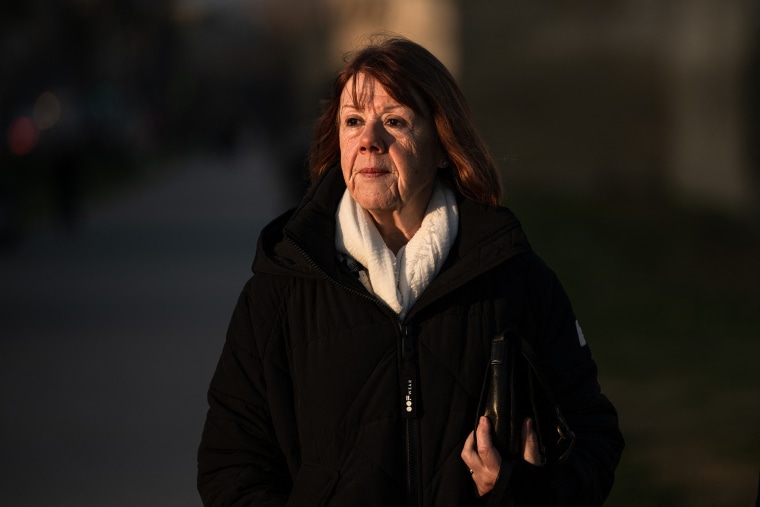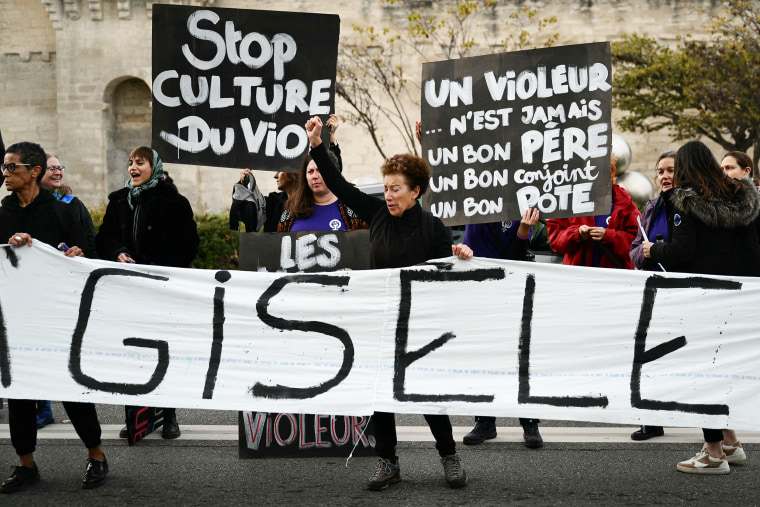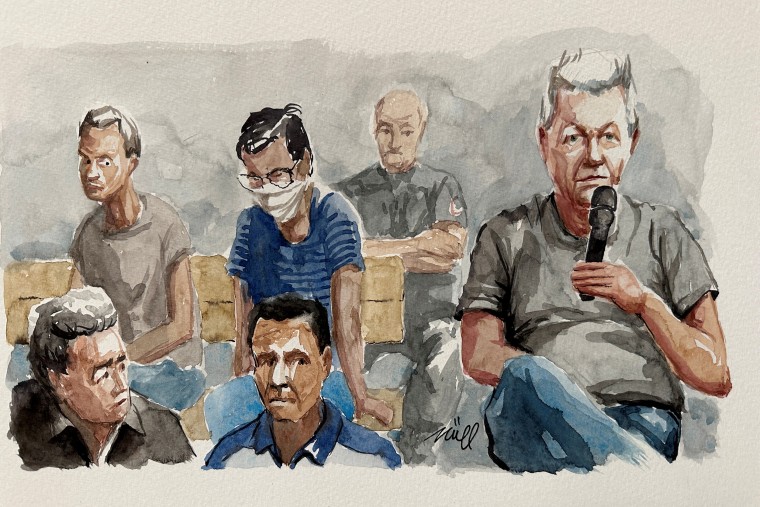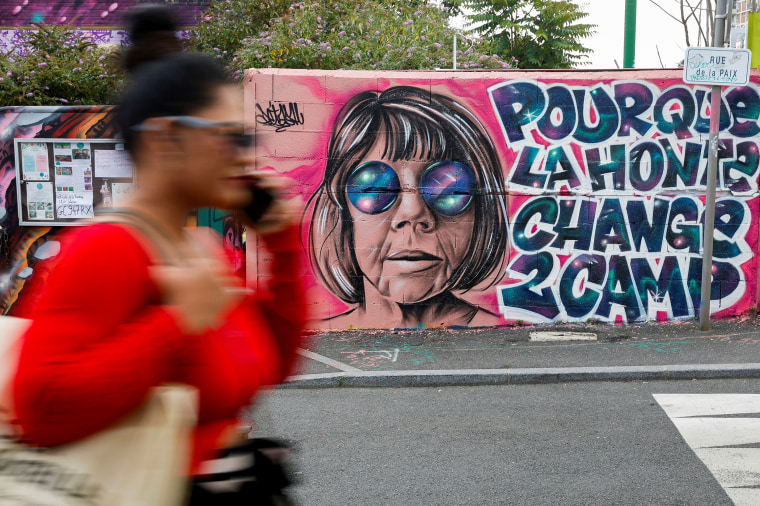French mass rape case could highlight a second wave of the #MeToo movement
PARIS — When France’s landmark mass rape trial began Sept. 2, the woman at its center appeared to shrink as she arrived at the stark courthouse in Avignon, her face hidden behind dark sunglasses and surrounded by a cordon of lawyers and loved ones.
Gisèle Pelicot, 72, eventually found her voice, bringing into the light not only the inconceivable abuse orchestrated by her husband, who has pleaded guilty to drugging her into oblivion and inviting men to rape her, but a culture that many activists have called sexist, tolerant of violence toward women and resistant to change.
A verdict is expected Thursday, with 51 men including her now ex-husband, Dominique Pelicot, also 72, charged with her rape and sexual assault over a decade ending in 2020. The accused, ranging in age from 26 to 74, each face sentences of four to 20 years. About 15 have admitted to the facts, and of them only a handful have expressed remorse, but only Dominique Pelicot, a retired electrician, is expected to get the maximum, 20 years in prison.
No matter how the case plays out, many here say France will never be the same. How could it be, they ask, after so many supposedly ordinary men — among them a firefighter, a nurse, a journalist and a retired sports coach — were filmed committing unspeakable acts on a snoring grandmother.

“It brings us back to the idea of who we are as a society, for normal men to commit acts that are totally transgressive and criminal,” said feminist, lawyer and author Anne Bouillon. With domestic violence complaints in France doubling since 2016, she said, the Pelicot case highlights the fact that women are most at risk at home, threatened by partners.
For Blandine Deverlanges, a high school teacher and founder of the feminist group Les Amazones d’Avignon and a steady presence at the courthouse, the case has tapped a vein.
“There is a lot of anger,” she said. “It’s much larger than the issue of rape. It’s a question of listening to what women have to say.”
Several feminists wondered whether France is in a second wave of the #MeToo movement, which rippled through the film industry here after Hollywood mogul Harvey Weinstein’s takedown in 2017 but failed to land the same punch on a broader spectrum as in the United States and other countries. France has a history of defending bold-faced men who act badly, such as exiled film director Roman Polanski. Famous French women like the actress Catherine Deneuve didn’t help the cause by signing a letter that defended Depardieu and other men’s “freedom to pester” women.
But women say the climate feels different this time. Last week, in another closely watched trial seen as France’s first major #MeToo case, Christophe Ruggia, a little-known film director, was charged with isolating and repeatedly sexually assaulting rising star Adèle Haenel, beginning when she was 12 and he was 36. Haenel, now 35, eventually left the industry and denounced adults who failed to help her. A verdict is expected in February.

With tempers running high over the Pelicot case, activists are hoping to mobilize that outrage into an effort not only to help victims of sexual assault, but also to transform a society in which 75% of women say they are not treated equally, according to a 2024 government study.
“In France, we haven’t paid much attention to sexual violence,” said Muriel Réus, a radio host who started the organization Femmes Avec to help victims of domestic violence and sexual assault navigate the justice system.
Last year, 230,000 women reported they had been victims of sexual violence.
“That’s the equivalent of the population of Lille,” Réus noted, citing the city on the northern border with Belgium.
Much of the discussion has focused on the wording of France’s rape law, which some feminist lawyers say is vague, particularly in cases in which a victim is intoxicated or, like Pelicot, subjected to being drugged, known as “chemical submission.”
Dominique Pelicot has admitted crushing large doses of sleeping pills and anti-anxiety medication into his wife’s food and drink. She would discover the truth only in November 2020, weeks after police arrested her husband after he was caught filming up the skirts of women in a supermarket.
Rape is defined under French law as an “act of sexual penetration” committed “by violence, coercion, threat or surprise.” Defense lawyers have insisted that their clients did not intend to commit rape because Dominique Pelicot invited them into the family home, and gave them careful instructions on what he wanted them to do to his wife.
“This is not American law. In France, you don’t need to have obtained the victim’s consent necessarily to ensure that it’s not rape,” said lawyer Guillaume de Palma, who represents several of the defendants.
“We have a real problem with French law,” said Magali Lafourcade, secretary general of the National Consultative Commission on Human Rights. “There are a huge number of situations which are not rape under French law [but] which are rape in the eyes of the victim.”
She said most European countries have adapted their laws and procedures to streamline rape investigations and help victims.
Lafourcade, a veteran magistrate with experience investigating sexual assault cases, was among 500 activists who signed an open letter calling for a consent provision to be added to the law.

But other activists and lawyers say the law is sufficient, with consent implied. Anything more explicit, they say, would force the victim to prove a lack of consent.
Opposing camps do agree on one point: France must overhaul a system that makes it difficult to report sexual violence. From making a police report to following up with a timely medical exam, they agree that it is often a luck of the draw whether a police officer will follow proper procedure or a hospital or an emergency room nurse will agree to take essential DNA samples.
Aurore Hendrickx, 26, a Paris event planner, said she has a few friends who have been sexually assaulted, and tried without success to file a report with the police.
“Most of the time, they were almost laughing at them,” she said of the police response, adding that a stunning 90% of her friends have been sexually assaulted or raped. One friend was almost killed by a violent partner.
If police give victims the brush-off, it is often no better at hospitals, where traumatized women are often turned away, advocates say.
Filmmaker Linda Bendali, who has researched cases of chemical submission — sometimes called date rape — said a friend’s 23-year-old daughter woke up naked in a strange man’s bed last March with no idea how she got there. Her last memory was sipping a drink in a Paris bar.
“I called the hospital and told them they could see her now. They said, ‘No, come back tomorrow,’” Bendali said, fuming, adding that she “pushed hard” to demand they take timely blood and hair samples, essential to prove whether the victim had ingested drugs.
While the victim is awaiting a court date, that is a rare occurrence. Only 6% of rape complaints are investigated in France. After that, a trial is conducted behind closed doors — a process that feminist historian Christelle Taraud called “truly horrible for the victim,” who is often treated badly by the defense lawyers, with no public accountability.
Taraud called it an “electric shock” when a judge reluctantly approved Pelicot’s demand to keep her trial open, even when intimate videos of her were aired. Finally, Taraud said, the public got to hear and see evidence of the horrific violence inflicted on Pelicot, whose show of strength has made her an international icon.
“They treated her like a piece of meat,” Taraud said.
In testimony that left many spectators speechless, some of the men appeared to be acting out porn film fantasies. One of them, a former firefighter busted with thousands of images of child pornography, gave a thumbs up to the camera during the assault.
The defendants, who met Dominique Pelicot in a now-defunct online chat room called “without her knowledge,” have told the five-judge panel that they believed the prone woman was a willing participant. Though her lolling head would seem to indicate otherwise, they called the petite woman, often dressed in lingerie, a swinger acting out a “Sleeping Beauty” fantasy.
“I’m a rapist, like the others in this room,” Dominique Pelicot said at the start of the trial. Slumped in a glass box, he was separated from the other defendants.
Dominique Pelicot’s cache of 20,000 photos and videos included snaps of his daughter, Caroline Darian, naked in bed. While he has insisted that he did not abuse her, Darian, whose book, “I’ll Never Call Him Dad Again,” will be published in English next month, told the court that she’ll never know what really happened. “Did he also drug me?” she wondered. “Worse still, did he abuse me?”
In her final statement to the court, Pelicot made it clear that she is hoping her humiliation won’t be in vain.
“It’s time that the macho, patriarchal society that trivializes rape changes,” she said.
The “Gisèle effect” extends beyond Avignon, where the retired logistics manager is applauded and handed bouquets of flowers. Schoolgirls call her name. Strangers send gifts. In a phenomenon that must be deeply satisfying to the woman who wanted “shame to change sides,” activists say women who hadn’t dared speak about domestic violence and sexual assault credit Pelicot with giving them courage to share their stories.
“It’s totally because of Gisèle that I have the strength to talk about it,” said Latika, 33, who is still recovering from trauma four years after divorcing a violent husband.

The beatings she said she endured were only part of the story. Latika said she learned the man she met at age 17, the father of her children, had been feeding her drugs for years. Like Pelicot, there were signs something was off, but she didn’t connect the dots. “One night I didn’t drink all of my tea,” she said, and she awoke to find her husband raping her.
NBC has not been able to independently corroborate her allegations.
Latika has found solace as part of an “equine therapy” program at Lucky Horse, a 25-acre ranch nestled in the foothills of Mount Ventoux in the picture-postcard village of Mazan, about a mile from the former Pelicot home.
Marion Vogel opened the ranch with her husband, a psychotherapist who has worked with domestic violence survivors, to help women develop “life skills” by working with animals. They ride horses without saddles and stirrups “to connect body to body.” They learn to trust themselves.
First up for Latika was overcoming her fear of horses. She spent half a year building up her confidence tending to an adorable Shetland pony before graduating up to Zéphyr, a sleek champagne quarter horse with a white slash between his eyes who is now her favorite.
She brushes Zéphyr’s silky mane and takes him for rides in the same lanes and fields where, Vogel noted, Pelicot used to take long walks.
Like Pelicot, Vogel said, these women “all have something to fight for.”

